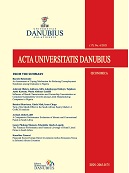Determinants of Food Insecurity during COVID-19 Pandemic in Nigeria: A Random Effects Ordered Probit Approach
Determinants of Food Insecurity during COVID-19 Pandemic in Nigeria: A Random Effects Ordered Probit Approach
Author(s): Tolulope Olayemi Oyekale, Abayomi Samuel OyekaleSubject(s): National Economy, Security and defense, Health and medicine and law, Socio-Economic Research
Published by: Editura Universitară Danubius
Keywords: COVID-19; Food Insecurity; Random Effects; Ordered Probit Regression; Nigeria;
Summary/Abstract: COVID-19 is reversing the global development progresses already attained over the past few decades. Attainment of zero hunger in the Sustainable Development Goals (SDGs) is being threatened, and comprehensive approach in managing the pandemic is urgently required. This paper analyzed the determinants of food insecurity status during COVID-19 pandemic in Nigeria. The data were the second, fourth and seventh rounds of COVID-19 National Longitudinal Phone Survey (NLPS), that were carried out in June, August and November 2020, respectively. Food insecurity status was computed with questions on Food Insecurity Experience Scale (FIES), and analyzed with Random Effects Ordered Probit Regression. The results showed that food security improved from 12.19% in June to 24.65% in November. There was a decline in the percentage of severely food in secure households in urban areas from 54.67% in June to 44.53% in November, while that in rural areas declined from 60.69% in June to 45.34% in November. The Panel Probit regression showed the presence of significant heterogeneity across the panels. Household size, age, male, tertiary education, North West residence, public administrator, business or traders and construction job showed statistical significance (p<0.05) with negative sign, while social assistance has positive sign. Nonperception of COVID-19 morbidity and financial risks significantly reduced food insecurity (p<0.01). It was concluded that interventions to address the COVID-19 pandemic must critically evaluate its welfare impacts given absence of effective social assistance with adequate focus on female headed households, the illiterates, unemployed and youths.
Journal: Acta Universitatis Danubius. Œconomica
- Issue Year: 17/2021
- Issue No: 6
- Page Range: 67-83
- Page Count: 17
- Language: English

